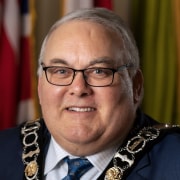In this episode of “Better Cities by Design”, we explore St. Thomas, Ontario, a Canadian city with a proud transportation history that is now shaping the future of sustainable manufacturing and urban development. Once known as the “Railway City,” St. Thomas is embracing a new chapter in its legacy with the creation of Yarmouth Yards, a 1,500-acre industrial park anchored by PowerCo’s electric vehicle (EV) battery gigafactory.
You have not accepted cookies yet
This content blocked. Please accept marketing cookies. You can do this here.
Subscribe on your favourite platform
Join the Mayor of St. Thomas, Joe Preston, and Scott Arbuckle, Arcadis Canada’s Country Director, as they tour the site with our correspondent Grayden Laing. Together, they share insights into this transformative project, the vision behind it, and its far-reaching implications for the city, the region, and beyond.
From its 19th-century origins as a railway hub to becoming a key player in Canada’s automotive industry, St. Thomas has always been a city of movement and growth. Today, the rise of electric vehicles and green energy has presented St. Thomas with a chance to rebuild its economy and redefine its identity. The Yarmouth Yards industrial park is the centerpiece of St. Thomas’ transformation. Spanning 1,500 acres, it will house PowerCo’s EV battery gigafactory on a 377-acre site, with space for additional manufacturing facilities, housing, and infrastructure. This development not only supports the green economy but also lays the groundwork for long-term urban development.
Take a closer look at how St. Thomas is building a sustainable future and hear from the people leading this transformation in this episode of “Better Cities by Design”.


The Arcadis global podcast
Better Cities by Design
Episode transcript:
We recognize that not everyone is able to listen to our podcast, which is why the show is also available in text. If you would prefer to read what happened in the show instead of listening, please click the link below for the episode transcript.
-
Read full transcript
00:05
Davion Ford
Welcome to Better Cities by Design, a podcast brought to you by Arcadis, where we talk to change-makers who are working to make our cities better places for people to live, work and play. I'm your host, Davion Ford. This is a special episode, in which we will take you to St. Thomas, in Ontario, Canada, to learn about Yarmouth Yards, a 1,500-acre industrial park that is set to revolutionize the city.
00:39
Grayden Laing
Nestled in the heart of Southwestern Ontario, just two hours west of Toronto, lies St. Thomas—a city with a rich transportation history and an eye firmly on the future growth and prosperity of its people. In the late 19th century and at the start of the 20th, St. Thomas became known as the “Railway City,” its economy and communities shaped by the tracks that run through it today. At one point, it had eight different railway companies operating out of it with over 100 trains moving through the city each day at its peak in 1914. This rail traffic significantly increased the city’s population and intrinsically tied its legacy to the transportation and manufacturing industries.
Fast forward several years, and St. Thomas found itself home to the Canadian production of iconic vehicles such as the Ford Crown Victoria Police Interceptor which was ubiquitous in law enforcement fleets from 1992 to 2011. Similar to other automotive hubs, the 2008 recession’s impact on the automotive industry led to Ford and Sterling closing their doors in St. Thomas.
Now, as the popularity of electric vehicles grows globally, an opportunity for St. Thomas to start a new chapter in its transportation and manufacturing legacy has emerged. In 2022, Volkswagen-backed PowerCo chose St. Thomas as the destination for its first overseas electric vehicle battery gigafactory. PowerCo’s commitment jump-started more than just St. Thomas’ automotive industry, it energized the city’s development plans.
Yarmouth Yards is set to become a 1,500-acre industrial park that will be home to PowerCo’s electric vehicle gigafactory with space for additional manufacturing facilities.
I had the unique opportunity to tour the site and sit down with the Mayor of the City of St. Thomas, Joe Preston, to discuss the project and what it means to the city. Arcadis Canada’s country director, Scott Arbuckle, also joined us to discuss how the company is leveraging its planning, design and engineering expertise to help the city develop and implement critical infrastructure such as the road network connecting the site, a water booster pumping station, a sanatory pumping station and a railway shunting yard that is needed to transform Yarmouth Yards into a functioning industrial hub.
02:41
Grayden Laing
All right, so we're just driving onto the site right now. So, Mayor, what can you see as we're driving in here.
02:46
Joe Preston
Progress I see. Every time I come to the site, we see new things happening and bigger and better things happening but even on a cold and sunny day like today you still see people out here working and moving earth and creating roads and putting in pipes.
This is amazing for me each time I come to see how different it is and what we've moved and how much further along we are.
03:11
Scott Arbuckle
I’m constantly impressed every time I come out here. Just the phenomenal scale of additional work that’s occurred and the progress that has happened. It’s just incredible. And right now we're driving across what will be the PowerCo site. We're being driven by Nathan Bokma, the engineer on the site. Nathan, you tell us the exact size of the space here at PowerCo.
03:32
Nathan Bokma
The PowerCo site itself is 377 acres out of the 1,500 acre industrial park.
03:41
Grayden Laing
And as we're driving along here we can see rock trucks moving along the site with dust flowing up as they're trying to get the final amount of work in that they can before the weather cuts them off for the year. The progress here has been fantastic Scott. Like from your perspective on your team, seeing all this come together so quickly, what are your feelings on that?
03:57
Scott Arbuckle
This is one of those projects where, again, a gap of two months coming in to see what's happening is just absolutely phenomenal. I mean, two months ago, there was sort of the head wall of the abutment. There were still piers, and now all the concrete's in, all the roadbeds going in. It's just amazing how much has been done in such a short period of time.
04:17
Grayden Laing
All right, we just got back. We had a wonderful tour there. We talked a little bit about the site and now we're gonna jump into the questions about the Yarmouth Yards. So first question for you, Mayor. What does the new industrial development mean to St. Thomas here?
04:28
Joe Preston
What does it mean? It means a number of things. Certainly economic prosperity. It's the forward thinking of where St. Thomas will end up in the next generations because we've planned to do this.
04:40
Scott Arbuckle
For us at Arcadis, what is so great about a project like this is its foundational city building. You think about it in the context of the history of St. Thomas, you know, and all of the automotive -related work that came here and then left, you know, it's a reality of the evolution of cities. So for this to come back as new world construction, new world community building, it's about the project for sure, but it's also about everything that's tied to the project. The social impact that comes from something like this is truly transformational for a city like St. Thomas and for an economic region like Ontario.
05:17
Grayden Laing
St. Thomas’ population increased by over 10% from 2016 to 2021, a trend that is nearly double that of the national average at 5.2%. Several factors can be attributed to the city’s steady population growth, with the establishment of Yarmouth Yards one of the driving forces behind it continuing. With that in mind, the site is being prepared and designed with assets, such as roadways, hydropower, and a water booster system, to support PowerCo, but also future uses of the site that include housing and other manufacturing purposes.
Both the Mayor and Scott had comments about the vision and potential of Yarmouth Yards.
05:52
Joe Preston
It is a large project and it's all encompassing and no one person can do it all. Our people are pretty strong on the technical side but we have to have help from other levels. And so it's quite a bit more than just winning a contract in the beginning to get a gig of factory that everybody else in the world wanted to this site. It's one thing to do that, and that was daunting, but you know what's more daunting? The day-to-day, what's going on out there and how fast it can change. As we now attract other industries to Yarmouth Yards, along with at the same time building an extremely large factory for PowerCo, things change. Well, wait, what industry is that? And what would their needs be?
Well, their needs may be a greater amount of hydro than we currently, you know, provided for that spot, or their needs may be a greater amount of water than we thought. Well, funny enough, working together, collaboratively, we prepared to be able to move things around the different spots of this site, at least in our heads, as other industries are attracted to Saint Thomas also. And that's that that's that generational change again. When we're all done, let me know because I'm not sure there will be a, we're all done. It will continue to move forward.
07:07
Scott Arbuckle
I personally love stuff like this because to me, again, it's foundational city building. It's, as the mayor said, it's not going to ever be over. It's the start of something. It isn't about one project. I mean, PowerCo is amazing, congratulations on bringing it to the city for sure, but it's the suppliers to PowerCo, and it's the suppliers of those suppliers. It's about new residential neighborhoods that will need to occur and be built to support the people who want to live and work here.
The mayor and I had a conversation a couple of weeks ago. It's also about the broader social impact of a project like this. The mayor had a really interesting perspective on what the region needs to be doing from an educational standpoint to support training and workforce development. And to move that forward as a region, I think that's tremendous and I think that's really unique thinking that it isn't about what one city wants to achieve, it's about what a region wants to achieve and what it means to its entire population.
08:13
Grayden Laing
Since October 8, 2020, the federal government of Canada has announced investments totaling over $46 billion dollars across the EV supply chain. These investments have attracted automotive suppliers like Volkswagen and led to Canada being recognized on global rankings, including it overtaking China for the top spot in Bloomberg NEF’s Global Lithium-Ion Battery Supply Chain Ranking. This annual assessment rates 30 countries on their potential to build a secure, reliable, and sustainable lithium-ion battery supply chain and marks the first time in four years that China has not ranked first.
Here is Scott’s and Mayor Preston’s thoughts on the energy transition and sustainability.
08:55
Scott Arbuckle
You know, look, the reality is that sustainability and energy transition, it's got to be at the forefront of our consideration as we move forward. You know, the federal government, the provincial government has identified energy transition as an important part of economic development in Ontario and in Canada. We need to move forward with that mandate, and I think this is one of the first projects that certainly gets us out of the ground. Canada is uniquely positioned. They really are. Canada is in a place where we have the natural resources that go into EV batteries. So we can do the mining, we can do the extraction, we can do the refinement, We can create the EV batteries themselves in plants, and then we have the auto plants that we can put them in the cars.
So Canada really needs to be at the forefront of this as it moves forward.
09:45
Grayden Laing
Mayor, we’re talking about how an industry can influence the future of a city. I wonder if you can talk about why, it’s so important to get this right?
09:52
Joe Preston
Because we can only predict where we are today. Today, you know, that's really what we're looking at. But when you choose industry like EV batteries or the modernization of the automotive sector, you can at least reach out a generation, at least reach out a couple of decades. Now, how else can we continue to modernize that?
How do we develop the next phase of that? Where's the laboratory tech that's going to decide the better battery or the other way to run electric vehicles. If you choose a win out of this and stop, you haven't done what was right for your community. You have to fight for the wins, but you also have to fight for the future and the next generations and the kids that will get to stay home in St. Thomas instead of having to move somewhere else. The Transportation Networks we've now developed because of this site that will be there forever that won't just help PowerCo but help every other industry in town. So we're we're doing the the things that that have a little bit of foresight, but what I've learned is that's only as good as what you thought of that day. You still got a plan for the next, the next, and the next.
10:58
Grayden Laing
Local governments play a critical role in providing incentives, infrastructure support, and ensuring a city is ready to host such a large-scale manufacturing facility, such as PowerCo’s EV factory. St. Thomas is no exception—it worked diligently with all levels of government in Canada to make sure it was ready to attract such a transformative project for the green economy. On the topic of what it takes for such a large project to succeed, and the role City Council has played, both the Mayor and Scott had thoughts.
11:23
Joe Preston
I have the world's greatest town city council. They are just have been working together on on problems–not just this one. This is a this is a program that we knew we needed to have if we were going to grow at the rate St. Thomas was growing we knew we had to create jobs. So that's what that kind of started this bit, but we've had other issues. We've got housing crisis like other places in Canada, we've got congestion problems on our roads like other places in Canada, but you've got to say to yourself, "Not my community. Go forward. What do we do next? How do we do the next big thing?" And even this, this is a win for St. Thomas, sure enough it is, right? But it's a win for the whole region and we're smiling and sharing as we watch other communities develop and grow based on their geography to where this site is, smaller communities now putting in housing they wouldn't have otherwise done and certainly helping St. Thomas with a housing crisis because there's housing being built. The road networks that MTO and the rest of the region are looking at, the workforce development piece. We've got to train people how to make batteries and I'm not sure any of us know how to do that yet, but through the education system, Fanshawe College and the universities, we will, we'll get there, but that's the dream forward. Surround yourself with something that you can think about what's next rather than, "Okay, that one's done."
12:42
Scott Arbuckle
You know, this is a council that really needs to be applauded for stepping up and saying, this is something we want to see happen. We're going to do what it takes to bring it along. To me, there's three aspects. It's vision, it's collaboration and it's partnership. And the mayor and his council, they created that vision. They established those partnerships and that collaboration with all levels of government, and that's what it took to bring this here. It took all levels of government with the vision of St. Thomas Council. And then the partnership and collaboration piece extends beyond levels of government, obviously, into industry partners. And Arcadis is just delighted to be involved in a project of this scale and supporting community development of this kind. Contractors, everybody who's involved with the project has to move forward with the same vision, with a view to partnership, with a view to collaboration.
You know, we see projects of scale all the time, not often a project of this scale, but certainly projects of scale. And they are either successful or they fail because of how everybody decides to work together or not. And this is a council that has set a tone about we're working together, we're gonna take issues as they come, we're going to adjust as we need to, we're going to do this in the spirit of partnership and that has made all the difference here.
14:07
Grayden Laing
In 2023, 11% of all new motor vehicle registrations in Canada were for zero-emission vehicles, a 49% increase from the year prior. Similarly, in the US, EV sales reached 800,000 units in 2023, marking a 50% increase from the previous year. This surge in demand in North America is fuelled environmental concerns, government policies, and technology advancements. The creation of EV battery plants, like the one planned for Yarmouth Yards, will be essential to meeting increased EV demand, supporting local production, and facilitating global energy transition targets.
Both the Mayor and Scott reflected on the benefits of supporting an EV supply chain in North America.
14:47
Scott Arbuckle
You have to appreciate this project in the bigger picture, right? And I call it an ecosystem. So where are we relative to the renewable energy ecosystem. And you could certainly say, well, you know, we'll leave the plants somewhere else and we'll ship things overseas. Well, that has a sustainability issue to it as well, right? Whereas you're talking about Canada as a country that's uniquely positioned in terms of having those renewable resources available, right? Having the raw materials, having the ability to extract and refine them, having the ability to manufacture them, and doing those things close to home or closer to home just make an awful lot of sense.
15:33
Joe Preston
Well, there's one other piece that I can show it by my conversation with the Federal Environment Minister. He's so pleased that this is happening in Canada. It's right. It's the right thing to do. He made certainly great point pointed efforts to say is by a certain year the internal combustion engine won't be there and we'll be driving electric vehicles and and he can point to St. Thomas attracting PowerCo as one of the great things, right, but I went and spoke to him and I said “Minister, a hundred years ago we've had railways everywhere and that was the most environmental friendly way we had of moving product and people. But many communities now are stuck with huge amounts of brownfield situations based on the industries we previously had.” We're trying to take a piece of land and turn it into an environmentally available land to build environmentally sensitive products, right? And we have to take it in the total picture, I need to build housing in this community and some of it has to go where I currently can't build on that land because of the contamination that it has. We can, probably because what we're doing, now afford to go clean some of those lands and we wouldn't have been able to do it and because we've driven the drive for the need for new housing and especially neat, high density, sustainable housing, right, on land that would otherwise would sit another 50 years vacant because of its contamination. We'd love the country and the province's help and also seeing that this sustainable project can be an impetus to move forward to correct the past also.
17:07
Scott Arbuckle
I think, you know, there's great global examples of cities that, you know, have really had an environmental, a sustainable focus that have cleaned up their brown fields that have cleaned up... Right, or their harbors or whatever it happened to be, absolutely. And then created sites that are able to be redeveloped with higher density that can support transit infrastructure.
17:32
Joe Preston
And walking trails through what used to be a contaminated site and safe active transportation methods. And look, we've got it all planned.
17:40
Scott Arbuckle
Projects like this for a municipality from an economic development perspective in particular, they're once in a lifetime. And there's scary things to think about. You know, this, this is a major, major undertaking for St. Thomas and the broader region. And I'm sure other municipalities are thinking about these projects as well.
And you do have to dive in and you do have to have some faith. You got to have a strong council that's willing to support the vision behind it. But you do need to take those opportunities when they present themselves because they will be absolutely transformational for communities.
18:18
Grayden Laing
Well, I think I can speak for a lot of people from St. Thomas to say it's really exciting to see the future from where we're sitting because it's happening right here. Mayor Preston, Scott, thanks for joining us.
18:31
Grayden Laing
Canada’s natural resources, including abundant lithium and other critical mineral deposits, position the country as a leader in battery manufacturing. With Yarmouth Yards offering hundreds of acres of land being prepared to meet the needs of industrial manufacturers worldwide, St. Thomas is positioning itself to become a major manufacturing hub with a specialty in EV batteries. Based on the city’s current plan, the additional tax revenue from this industry will also allow it to redevelop the brownfield zones created from previous industrial areas and transition those now vacant lands into housing. It’s an ambitious plan, but as the Mayor says, by identifying and working with the right experts it should not only be achievable but also provide the economic blueprints for other communities looking to do the same.
19:14
Davion Ford
That’s it for this episode of the show! I want to thank the Mayor of St. Thomas, Joe Preston as well as Scott Arbuckle and our correspondent Grayden Laing. Please, stay tuned for future episodes as we continue to bring change-makers to the table who are driving progress in urban development. And if you haven't already, be sure to subscribe and check out our other episodes. I’m Davion Ford, and you’ve been listening to Better Cities by Design, a podcast brought to you by Arcadis, the world’s leading company delivering data-driven sustainable design, engineering, and consultancy solutions for natural and built assets. You can learn more by visiting our website arcadis.com. or by following Arcadis on LinkedIn or Facebook. And please, stay curious, get inspired, and remember, the future belongs to those who dare to make a difference in the cities we call home.






